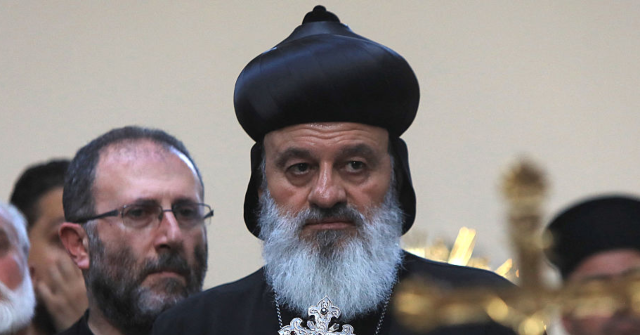Archbishop Ignatius Aphrem, the patriarch of the Syriac Orthodox Church, told the Kurdish outlet Rudaw in an interview published Wednesday that the president of Syria, former al-Qaeda offshoot terror leader Ahmed al-Sharaa, personally promised that he would respect the rights of Christians.
The Christian leader nonetheless noted that the situation is difficult for Sharaa and his government, as “there is no complete control over the situation in Syria” and Christians do not appear to trust the government. Many who fled during the civil war, which lasted from 2011 to 2024, have yet to return, and a large number of those in Syria failed to participate in the invite-only parliamentary “elections” Sharaa’s government held this weekend.
Syria is in a state of unprecedented transition after Sharaa’s jihadist terrorist organization, Hayat Tahrir al-Sham (HTS), overthrew the longstanding dictatorship of Bashar Assad in December. Prior to the ascent of Sharaa’s group, an al-Qaeda offshoot, to power, Syria was mired in a civil war featuring at one point as many as ten different factions vying for power, including mass murdering entities such as the Islamic State.
Following the toppling of the government, Sharaa abandoned his jihadist nom de guerre, “Abu Mohammed al-Jolani,” and began wearing Western-style suits, regularly delivering addresses encouraging the global community, and especially the West, to invest financially in his nascent government. Sharaa recently attended the United Nations General Assembly, the first time in decades a Syrian head of state addressed that forum, primarily emphasizing the importance of foreign investment into Syria.
Though the civil war is over, clashes have persisted throughout Syria. Jihadists believed to be associated with the new government conducted massacres of Alawite Shias in the first half of the year, apparently in retaliation for Assad and his family being Alawites. Reports documented threats of similar massacres against Christians at the time, and recent events in Christian communities, including the slaughter of local Christians by uniformed individuals, have intensified tensions.
Archbishop Aphrem conceded that the Christian population had declined dramatically in his remarks to Rudaw, noting that many are afraid to return.
“Unfortunately, many Christians have migrated from Syria due to the lack of stability and the unclear vision of the future of Syria,” he explained. “In my opinion, the number does not exceed 500,000 Christians in Syria from more than 1.5 million 10 years ago.”
He noted that the Sharaa Islamist government is attempting to “reassure Christians and give positive signals on this issue,” but with mixed success: “at this time, many Christians are leaving. And this is not good for Christians.”
The archbishop confirmed he had met with Sharaa in May, calling the conversation “constructive and positive.”
“We want Christians to be citizens of the first degree… And this is what we heard from the president. This is what he really promised,” he asserted. The religious leader hinted, however, that Sharaa lacked the power and institutional support to fulfill that promise.
“First, there are many regional and foreign interventions in Syria. Second, there are different groups that reached the government with the president, Ahmed Al-Sharra [sic],” he explained, presumably including jihadists who want to eliminate the Christian population. “And they differ in the degree of their religious commitment and openness to others. So, of course, there are some obstacles that prevent this government from implementing everything it wants now. But I personally do not doubt the government’s intention.”
Sharaa announced in March, after the massacres of Alawites, a “constitutional declaration” with the intent to impose an Islamist regime on Syria. The decree created three branches of government, but the judiciary created a sharia court system, which Sharaa does not have the authority to rein in. The “constitutional declaration” also bans non-Muslims from being president of Syria. The archbishop noted in his remarks to the Kurdish outlet that the “constitutional declaration” was not, in fact, an actual constitution — merely a statement of intent. Despite this, he lamented, “this constitution does not meet the aspirations of the Syrian people in general.”
“Especially in the Islamic jurisprudence, which is the only source of legislation in Syria. Of course, we know and respect that Syria is a Muslim country. And the majority of the Syrian people are Muslims,” he continued. “But Syrians must have full rights, whether they are Muslims, Christians, or even non-Muslims. This constitution must be based more on civil principles. And this is what we missed in this constitutional declaration. And we hope that it will be amended in the future.”
The Archbishop emphasized that Christians have supported the HTS government, despite its jihadist background, “because it is in the interest of Christians and all Syrians to have stability in Syria, to have peace and to live with love and peace.”
“Christians are Syrians. They are the original inhabitants of Syria. They are from the original people in Syria and have existed for thousands of years,” the archbishop noted. “We want Christians to be equal in all their rights and duties. It is our duty to serve our country. But we want to be given the opportunity to serve this country.”
Follow Frances Martel on Facebook and Twitter.
Read the full article here


